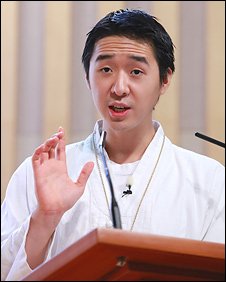![]()
The Words of Hyung Jin Moon From 2009
|
|
The Words of Hyung Jin Moon From 2009 |

It is one of the most controversial religious movements of the last century.
Founded in Seoul in the 1950s by the Reverend Sun Myung Moon, Unificationism has attracted hundreds of thousands of members worldwide.
But the movement has been accused of cult-like practices, with its leader's followers dubbed "Moonies".
As Sun Myung Moon approaches his 90th birthday, he has handed over key responsibilities to one of his sons.
Hyung Jin Moon is just 30 years old and grew up in the United States, where he studied theology at Harvard University.
His background means he has already been exposed to a wide range of religious traditions and seems unafraid to introduce aspects of how other faiths worship into Unification Church services.
Attending a meeting for English speakers on a Saturday afternoon at the Unification Church's Korean headquarters, the very first sounds I heard were pretty unexpected.
Earlier that week, I had interviewed Hyung Jin Moon and met members of the church's choir, rehearsing for the weekend's services.
They had been singing a specially written song about true love, reflecting the traditional family values which are so important in Unificationist beliefs.
But the service I attended began not with one of the movement's own hymns, but with contemporary mainstream Christian songs written in the US.
The adoption of such music is just one of the potentially surprising innovations being adopted by Hyung Jin Moon.
Members of the Unification Movement are probably best known for their approach to marriage.
Photos of mass weddings performed by Sun Myung Moon, where hundreds of couples marry simultaneously, have fascinated newspaper readers around the world for decades.
But in this area of church life, change is also in the air.
After the service, I met Frank and Elizabeth, who married in 1982 -- having never met each other beforehand.
They both flew to Seoul in 1982 to take part in a "matching ceremony" -- where the Sun Myung Moon would personally choose which man married which woman.
Frank remembers that he felt "very nervous" that day, but also says he was committed to the belief that the choice made on his behalf would be the right one.
"We grew up with a value to have trust in the judgment of Reverend Moon at that moment, so basically we were prepared to accept," he said.
Handing over the choice of a future life partner to Sun Myung Moon has been a defining feature of the movement -- but his son is clear that such practices are under review.
He tells me it would be logistically impossible for all Unificationists approaching marriage to be matched in the traditional way.
"It's modified greatly, where now people can meet, they can date, find out about each other. But the seriousness of the vow is still there," Hyung Jin Moon tells me.
"Will we continue in the way that we did, with the huge numbers? I don't believe so."
Unificationism is a movement which has already seen several changes of emphasis in its short history.
Originally called the Holy Spirit Association for the Unification of World Christianity, in the 1990s it became the Family Federation for World Peace and Unification.
The emphasis now seems to be shifting back to conceiving of the movement as a church, and using that clearly defined religious status as a way to campaign for the freedom of its followers.
For decades, some members have faced dramatic interventions from concerned relatives, especially parents, trying to get them to leave a movement.
Hyung Jin Moon is particularly concerned about the situation in Japan, where he alleges that several hundred members of the movement have been kidnapped against their will by parents trying to force their children out of Unificationism.
"There comes a point where we have to say 'no' -- no longer will we endure abuse because of our religion," he tells worshipers at the headquarters church in Seoul.
He told me that followers of the movement are unsurprised that their beliefs are often challenged.
"Every ancient tradition and modern tradition has faced misunderstanding and even persecution. We're not exclusive to this misunderstanding or treatment."
"But we also want to stand up for our rights -- if our rights as democratic citizens are violated, we do want to stand up and take non-violent means to legally find justice," he said.
They are the words of someone who seems determined to establish the faith founded by his father as a credible part of the religious landscape.
But Unificationists' belief that Sun Myung Moon and his wife are the Messiah and 'true parents of all humanity' puts the movement at odds with orthodox Christian churches.
So, even if the music is getting more mainstream and mass weddings are a thing of the past, Unificationism has a long way to go before it is simply regarded as one religion among many.